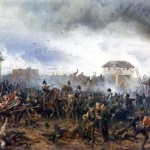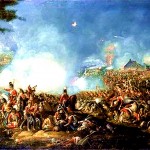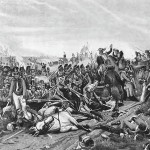The Battlefield at Waterloo is small, only 3 miles east/west and 1 1/2 miles deep on which massed nearly 70,000 allies and 71,000 French troops. Wellington had chosen his ground carefully since he had seen the battlefield previously. He deployed the allies on a reverse
slope of a ridge to protect them from artillery fire but with a wood behind which would delay any retreat if things went badly. Two strong points would dominate the battlefield, the farm houses of Hougoumont and La Haye Sainte, these would break up the force of the French attack throughout the day. Wellington had been promised help from the Prussian General Blucher and it would be the arrival of these reinforcements late in the battle which would finally turn the tide. On such a small and muddy battlefield there was little prospect of manoeuvres so the battle became a series of brutal frontal assaults by the French showing none of Napoleon’s typical skill.
The battle started on June 18, 1815 at around 11.30 a.m. One of the reasons for Napoleon’s defeat was that he delayed to initiate the battle as the ground was wet due to heavy showers the previous day. This gave enough time for the Prussian army to join the Wellington’s troops.
At 11.30 in the morning the French started their furious attack on Hugoument. Napoleon’s brother Jerome tried to take possession of the farm surrounding the war field. He involved his troop completely in the battle while Wellington stood obstinate. By 1.00 p.m. the Wellington troop started moving forward from the ridge and engaged the French army. Meanwhile, Napoleon received a message about the Prussian’s existence at St. Lambert and sent the Subervie’s and Domon’s cavalry to face the Prussians.
By four in the afternoon, the Prussians had started to arrive and the French had made little progress but attrition was starting to tell on the Allied forces. A last attack by the Imperial guard was routed and panic started to spread through the French forces. The battle was finally over. The allies lost 55,000 men and French 60,000, a horrendous cost prompting Wellington to say “Nothing save a battle lost is so terrible as a battle won”. Napoleon’s last great gamble had failed.



